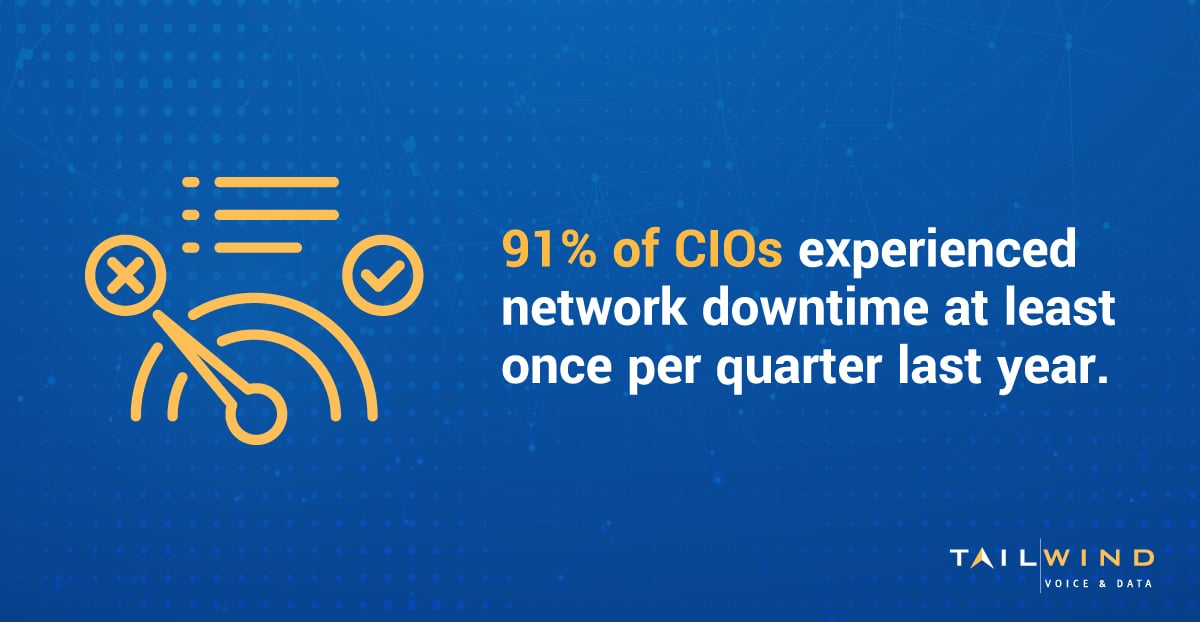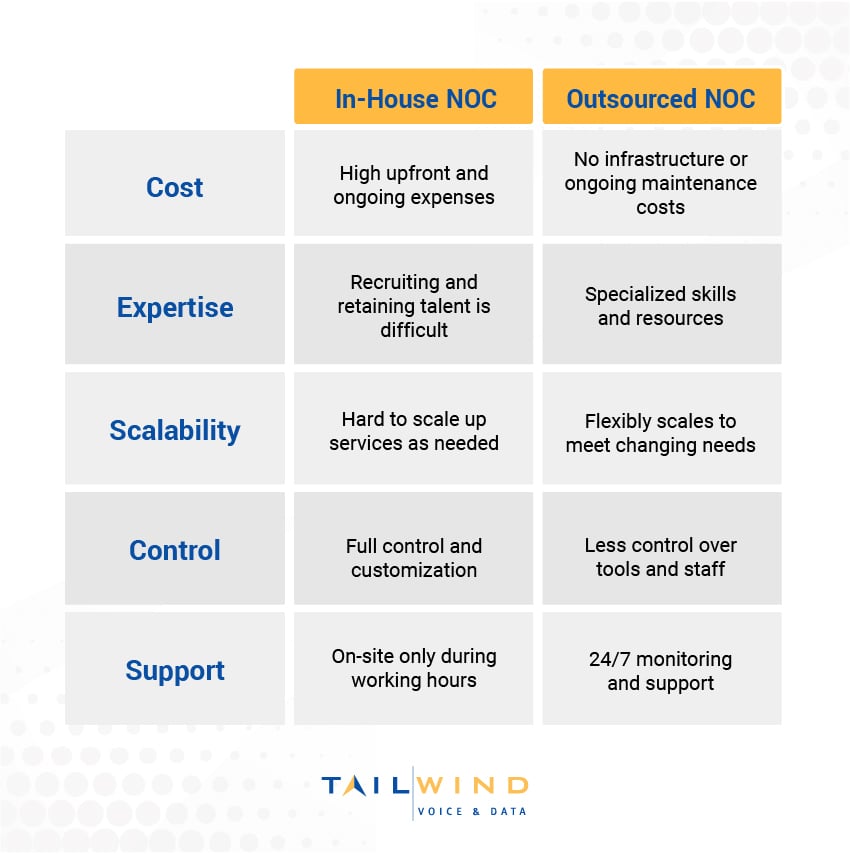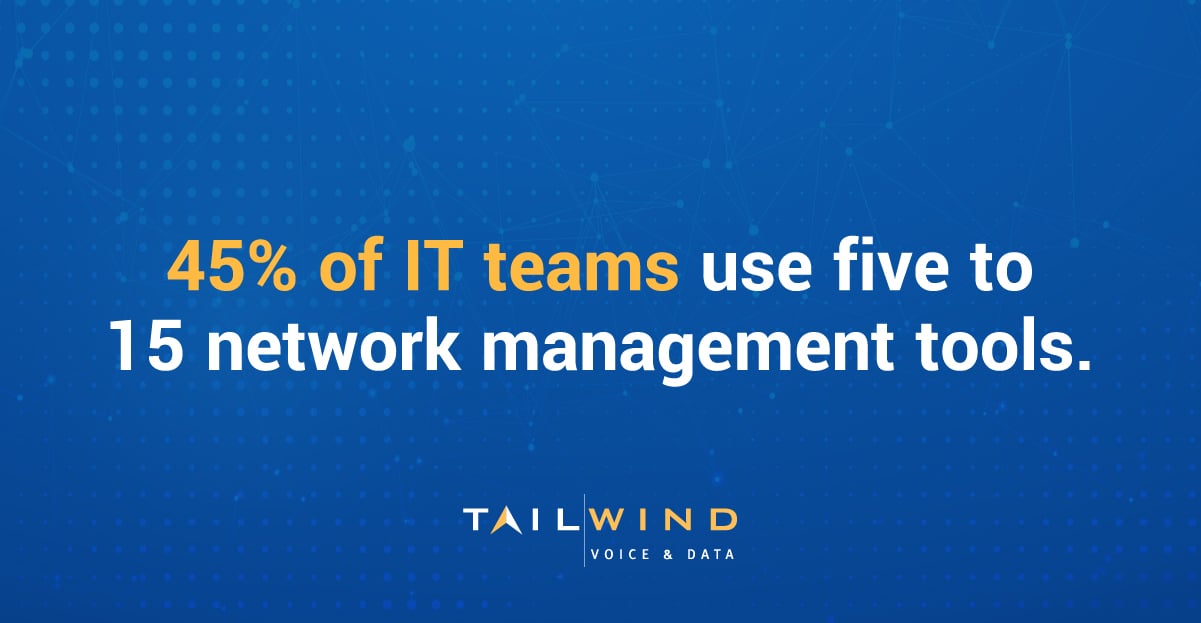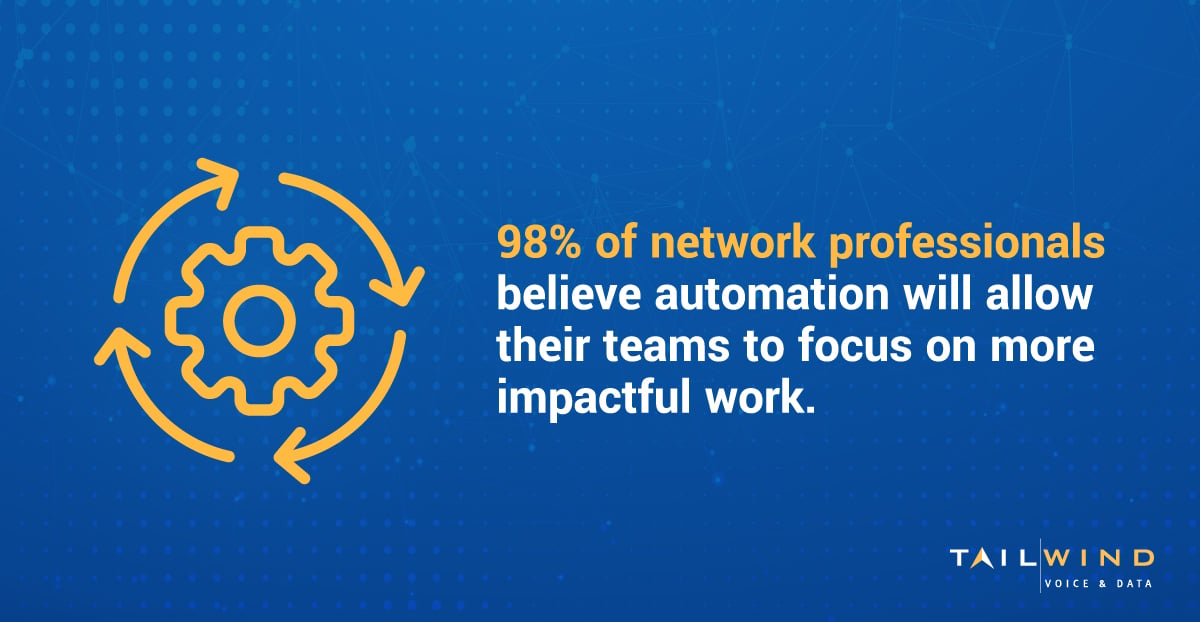A network operations center (NOC) is critical for businesses to maintain optimal network performance. However, managing a NOC in-house requires extensive resources that most companies simply don't have – resulting in security and performance issues that bring operations to a halt. A 2023 survey revealed that 91% of CIOs experienced network downtime at least once per quarter last year.1 And with 45% of IT teams using between five and 15 network management tools,2 identifying and resolving incidents quickly is more challenging now than ever.
In this blog, we'll discuss the responsibilities of NOC teams and how outsourced NOC services help organizations streamline network monitoring and management.
What Is A NOC? A Brief Definition
A network operations center is a centralized location where IT staff can monitor and manage an organization's networks and IT infrastructure. The typical NOC houses network monitoring tools and networking equipment, such as routers, switches, servers, databases, applications, and more. NOCs are essential for the early detection of network performance issues, allowing for prompt resolution before they escalate into major disruptions.
How Does A Network Operations Center Work?
NOC teams use specialized software and tools to monitor networks and gain visibility across the IT infrastructure. This allows technicians to assess network health, optimize performance, and address problems before they cause disruptions. The primary functions of a network operations center include:
Installation, Updates & Troubleshooting
NOC personnel are responsible for the deployment, configuration, and maintenance of the hardware and software that comprise the network environment. This includes installing software, servers, switches, and routers, as well as performing updates and patch management as needed. The NOC team troubleshoots any issues that arise with network system hardware or software to restore functionality quickly.
Data Backup & Recovery
NOCs ensure business continuity by keeping all critical data backed up and easily restorable in the event of data loss or corruption. They oversee the backup process across servers and databases, test restores, and configure offsite data storage for disaster recovery. If malicious network attacks or power outages occur, the NOC enables rapid recovery of data to minimize downtime.
Security Monitoring & Threat Detection
NOCs use specialized tools to monitor networks 24/7 for potential security incidents and anomalies proactively. This includes managing firewalls, VPNs, antivirus software, and intrusion prevention systems. The NOC serves as a first line of defense by identifying security threats in real time and responding quickly to mitigate the impact of breaches or cyber attacks.

Network Performance Optimization
By closely analyzing network traffic, resource utilization, and other metrics, the NOC can provide comprehensive visibility into overall performance and health. Reporting tools help identify optimization opportunities to enhance speed, reliability, and efficiency, enabling the NOC to fine-tune configurations for optimal network performance.
Communications & Incident Coordination
Smooth communications and coordination during an incident or outage are crucial for a fast resolution. NOC technicians facilitate communication between stakeholders and specialized teams to drive efficient problem-solving. They also coordinate across IT teams and provide status updates to keep leadership informed during issues.
Testing & Validation Of Networks
Proactive testing helps NOC teams detect problems before they can disrupt operations. NOCs run simulations to validate the resiliency and recovery time during network outages. They also test new hardware, software, configurations, and procedures through staging environments before deployment to minimize risks.
How NOC Teams Are Structured
Although every organization designs its NOC slightly differently, most follow a similar structure that combines tiered support levels and clearly defined roles. This structure helps teams handle a high volume of alerts efficiently while ensuring that complex issues are routed to the right experts.
Tiered Support Levels
Many NOCs organize technicians into levels based on skills and responsibilities. Level 1 staff focus on initial triage, basic troubleshooting, and handling common incidents according to predefined runbooks. Level 2 technicians work on more complex issues, investigate patterns across multiple devices or locations, and coordinate with other IT teams. Level 3 engineers typically manage the most critical incidents, design improvements, and evaluate changes that can prevent similar issues in the future.
Key Roles Within The NOC
A typical NOC team includes a mix of managers, engineers, analysts, and technicians. NOC managers oversee staffing, operations, and performance reporting. Engineers design monitoring strategies, maintain tools, and handle complex escalations. Analysts review trends, capacity, and recurring incidents to identify optimization opportunities. Technicians handle round-the-clock monitoring and remediation work, following documented procedures to keep networks stable and available.
Structured Escalation & Collaboration
The structured nature of a NOC allows incidents to move quickly from initial detection to resolution. When an alert is raised, it is logged, categorized, and assigned to the appropriate level based on severity and impact. If the initial responder cannot resolve it within a defined timeframe, the incident is escalated to a more specialized resource. Throughout this process, the NOC coordinates with other IT teams, such as security, infrastructure, and application owners, so that everyone is aligned on priorities and next steps.
Why Do Organizations Use Network Operations Centers?
Using a network operations center is essential for modern enterprises that rely on complex IT environments and can't afford the costs of prolonged downtime. A typical NOC focuses on maintaining continuous uptime and optimal performance of the network infrastructure and IT systems. NOC technicians monitor, manage, and respond to incidents to minimize disruptive network outages and ensure critical business systems are always accessible and operating efficiently.
Who Needs A NOC? Real-World Use Cases
A network operations center is especially valuable for organizations that rely on always-on connectivity across multiple locations, teams, and systems. While every business depends on its network to some extent, there are certain environments where a NOC quickly becomes mission-critical.
Multi-Location Businesses & Distributed Workforces
Organizations with many sites, such as retail chains, restaurants, logistics providers, and franchise networks, face a unique challenge. Each store, office, or warehouse depends on reliable connectivity for point-of-sale systems, inventory, voice, video, and cloud applications. A NOC gives IT teams a centralized way to monitor every location, identify issues early, and coordinate fixes without sending staff onsite every time there is an incident.
Regulated & High-Risk Industries
Healthcare, financial services, and other highly regulated sectors must balance strict compliance requirements with high expectations for uptime. They often run complex hybrid or multi-cloud environments that support critical applications and sensitive data. A NOC helps these organizations maintain visibility across the entire environment, enforce policies consistently, and respond quickly when performance or security issues arise.
Organizations Modernizing Legacy Infrastructure
Many enterprises are in the middle of modernizing their networks, adding SD-WAN, cloud services, and new collaboration tools while still supporting legacy systems. During this transition, the risk of misconfiguration, downtime, and tool sprawl increases. A NOC provides a central command center where IT teams can stabilize day-to-day operations while rolling out new technologies in a controlled, predictable way.
In-House vs Outsourced Network Operations Centers
There are two main NOC models for businesses: keeping operations internal or outsourcing to a managed NOC services provider. Each offers advantages and disadvantages:
In-House NOC
Operating an in-house NOC allows for maximum control and customization but also comes with substantial costs for infrastructure, staffing, and talent. Additionally, scaling an in-house NOC can be challenging and expensive during business growth.
Outsourced NOC
Partnering with a NOC services provider offers businesses access to specialized expertise and resources without large upfront investments. Outsourced NOCs can easily scale services on-demand to match evolving business needs, allowing internal IT staff to focus on core projects.

Cost
Managing an in-house NOC requires major upfront investment in infrastructure, tools, and staffing. Ongoing costs are also high for talent acquisition and maintenance expenses. An outsourced NOC eliminates these capital costs and provides network management services for a predictable monthly fee.
Expertise
Developing NOC team expertise in-house can be very difficult, requiring recruitment and retention of specialized technical talent. Outsourced NOCs provide access to this expertise without the HR demands.
Scalability
Scaling an in-house network operations center requires adding staff and resources, which can be time-consuming and costly. Outsourced NOCs provide seamless flexibility to scale up or down as business needs change.
Control
In-house NOCs allow for full control and customization over tools, staffing, and processes. By outsourcing network management services to a third party, organizations surrender some control in exchange for added expertise and resources.
Support
In-house NOCs are limited to staff availability during normal business hours, leaving the network environment vulnerable to performance and security issues. Outsourced NOCs provide 24/7 network monitoring and support for maximized uptime.

Common NOC Challenges & How NOCaaS Helps
Operating a network operations center is a significant commitment. Even organizations with mature IT teams can face recurring obstacles when they try to build and scale a NOC on their own.
Rising Operational Costs & Tool Complexity
Running an in-house NOC requires investments in monitoring platforms, infrastructure, and specialized staff. Over time, many organizations accumulate multiple tools to monitor different parts of the network. This can lead to overlapping functionality, fragmented visibility, and higher licensing costs. A NOC as a Service (NOCaaS) provider helps consolidate and streamline these efforts by delivering proven tools and processes as part of a single, predictable service.
Skills Gaps & 24/7 Coverage
Hiring and retaining experienced NOC engineers is challenging, especially when 24/7 coverage is required. Night and weekend shifts can be difficult to staff consistently, and finding talent with the right mix of network, cloud, and security experience can be time-consuming. NOCaaS partners bring an established, around-the-clock team to the table, allowing internal IT to focus on strategic projects rather than staffing a full follow-the-sun operation.
Keeping Up With New Technologies & Threats
Networks evolve quickly as organizations adopt cloud services, SD-WAN, IoT devices, and new collaboration tools. At the same time, threat landscapes are becoming more sophisticated. In-house NOC teams must constantly update runbooks, monitoring policies, and alert thresholds to keep up. An experienced NOCaaS provider continuously refines its practices across many client environments, applying lessons learned and new best practices to help customers keep pace without rebuilding their processes from scratch.
What Are The Benefits Of Using An Outsourced NOC?
Using a network operations center provides many advantages for enterprise businesses, including:
Fewer Business Disruptions
Keeping mission-critical systems and network devices available 24/7 is essential for most enterprises. Managed NOC services help minimize costly outages and downtime through proactive network monitoring, quick incident resolution, and business continuity strategies.
Enhanced Security
NOCs implement best practices and advanced tools to protect the organization's network infrastructure against evolving cyber threats. This includes managing firewalls, threat detection, vulnerability assessments, and compliance.
Increased Efficiency
The majority (92%) of network operations professionals say there are too many network updates needed to keep up with, and 68% of large organizations only update their network devices quarterly (or less).3 Leveraging outsourced NOC services enables an enterprise business's internal IT staff to focus their time and energy on strategic initiatives rather than day-to-day network operations.
Cost Savings
Outsourced NOCs eliminate the high capital and operating expenses of maintaining specialized staff and infrastructure in-house. A predictable monthly service fee is cheaper than hiring, onboarding, and maintaining the costs of full-time NOC technicians.
Faster Incident Response
NOC engineers use advanced remote monitoring and automation to identify and resolve security issues and inefficiencies, impacting the client network faster than internal staff.
Greater Flexibility
With outsourced NOCs, businesses gain flexible scaling of services and capacity as their network operation needs change. This scalability makes it easier to manage growth, seasonal traffic variations, and mergers and acquisitions.

How To Measure NOC Performance
A network operations center delivers the most value when its impact is visible and measurable. Defining clear metrics helps IT leaders demonstrate the business value of a NOC, identify opportunities for improvement, and align expectations with internal stakeholders.
Uptime & Network Availability
Availability remains one of the most fundamental NOC metrics. Tracking the percentage of time critical services and sites are available provides a straightforward view of how well the network is performing. Many organizations set availability targets for key systems and rely on their NOC to monitor and report on adherence to those targets.
Mean Time To Detect & Resolve Incidents
Speed matters when network issues occur. Mean Time to Detect (MTTD) measures how quickly the NOC identifies an issue after it begins, while Mean Time to Resolve (MTTR) tracks how long it takes to restore normal service. Together, these metrics show how effectively the NOC is handling incidents, from initial alert to final resolution.
Incident Volume, Patterns & Recurrence
Understanding what types of incidents occur most often, and where they happen, helps teams prioritize improvements. Tracking incident volume per site, device type, or application can reveal patterns that point to deeper configuration or capacity issues. Monitoring recurring incidents over time shows whether fixes are addressing root causes or only providing temporary relief.
Impact On IT Productivity & Costs
Effective NOC operations free internal IT teams from constant firefighting. Measuring reductions in unplanned work, the number of escalations to senior engineers, or the time spent on repetitive tasks provides insight into how the NOC is improving productivity. Some organizations also measure cost per incident or the cost of downtime avoided, connecting NOC performance directly to financial impact.
Where A NOC Fits With Your Help Desk & SOC
A NOC is one piece of a broader operational model that often includes a help desk and a security operations center (SOC). Understanding how these teams complement one another helps avoid confusion and ensures that incidents are routed to the right place from the start.
How The NOC Supports Network Health
The primary focus of the NOC is network performance and availability. NOC teams monitor devices, connections, and services across the environment, respond to alerts, and coordinate changes that keep systems running smoothly. They work behind the scenes to reduce outages, optimize configurations, and maintain the overall health of the network infrastructure.
How The SOC Focuses On Security
A SOC is dedicated to monitoring, detecting, and responding to security threats. While the NOC may handle some operational security tasks, such as monitoring firewalls and VPNs, the SOC performs deeper analysis of suspicious activity, investigates incidents, and manages the tools and processes used to reduce cyber risk. In many organizations, the NOC and SOC collaborate closely when an issue impacts both performance and security.
How The Help Desk Serves End Users
The help desk is the front line for end-user support. When employees or customers experience issues, they typically contact the help desk first. If a problem turns out to be related to underlying network performance or a broader incident, the help desk coordinates with the NOC to investigate and resolve it. This separation allows end users to work with a single point of contact while the NOC focuses on the technical details behind the scenes.
Coordinated Response Across Teams
In a well-defined operating model, the NOC, SOC, and help desk share information and escalation paths. The NOC may notify the help desk of a widespread incident so they can proactively communicate with users. The SOC may escalate an event to the NOC if a potential attack begins to affect performance. Clear roles and communication help each team contribute its expertise without duplicating effort.
AI & The Network Operations Center
Modern advances like 5G, edge computing, and the Internet of Things have exponentially increased the complexity of enterprise networks. Computer networks now have millions of endpoints that make oversight difficult for human NOC technicians, as the massive volumes of data and alarms generated can overwhelm response capabilities.
Artificial intelligence and automation tools help enhance NOC capabilities for these complex, large-scale networks. AI can analyze billions of data points across the company's network in real time to detect anomalies and predict potential issues before they occur. Machine learning algorithms draw insights from historical datasets to fine-tune predictive models and recommend solutions to optimize the network's performance. This gives AI-enabled NOCs greater foresight compared to relying on reactive troubleshooting by technicians.
Automation also allows NOCs to resolve repetitive issues and make configuration changes at scale across all network devices. Bots can execute routine tasks like adding new devices, patching vulnerabilities, adjusting capacity, and troubleshooting common problems automatically.
Together, advanced AI analytics and automated solutions transform business operations from reactive firefighting to a more proactive, streamlined process. Along with improved system management, NOC technicians can focus their expertise on higher-level network optimization projects rather than repetitive maintenance tasks. A whopping 98% of network operations professionals agree that automation will allow their team to focus on more impactful work.3
What NOCaaS Looks Like With Tailwind
Moving to a NOC as a Service model gives organizations access to mature processes, tools, and expertise without the overhead of building everything in-house. TailWind’s NOCaaS approach is designed to integrate with your existing environment while providing the depth and coverage needed to support complex, distributed networks.
Assessing Your Current Network Operations
Every engagement begins with an assessment of your current network landscape and support model. TailWind works with your team to understand your sites, critical applications, existing tools, and current pain points. This step helps identify coverage gaps, clarify priorities, and define the scope of NOC services that will provide the most impact.
Integrating With Your Tools & Workflows
TailWind’s NOCaaS model is built to complement your existing investments rather than replace them unnecessarily. The NOC integrates with your monitoring, ticketing, and communication tools where appropriate, or recommends adjustments when there are clear benefits to doing so. Runbooks, contact lists, and escalation paths are documented so that everyone understands how incidents will be handled.
Delivering 24/7 Monitoring & Incident Response
Once the NOCaaS service is live, TailWind’s team provides continuous monitoring and incident response across your environment. Alerts are triaged according to agreed thresholds and SLAs, issues are escalated when necessary, and remediation work is coordinated with your internal IT staff to minimize disruption. Regular communication keeps stakeholders informed throughout the lifecycle of each incident.
Driving Continuous Improvement
NOCaaS is not a one-time project. TailWind reviews incident trends, performance metrics, and recurring issues over time, working with your team to identify opportunities for optimization. These insights may lead to configuration changes, process adjustments, or broader network initiatives that further reduce risk and improve performance across your locations.
Network Operations Center (NOC) FAQs
What Is The Main Goal Of A Network Operations Center?
The primary goal of a NOC is to keep critical network services available and performing well. NOC teams monitor infrastructure, respond to alerts, and coordinate changes so that users and applications experience minimal disruption, even when issues occur behind the scenes.
Do Small And Mid-Sized Organizations Benefit From A NOC?
Yes. While large enterprises are often the first to build NOCs, smaller organizations with multiple locations, mission-critical applications, or limited IT staff can benefit just as much. NOCaaS makes it possible for these teams to access enterprise-grade monitoring and support without hiring a large internal staff.
How Is A NOC Different From A Help Desk?
A help desk is user-facing and focused on resolving individual support requests. A NOC is infrastructure-focused and works behind the scenes to monitor and manage the network. When a user issue is caused by a broader network problem, the help desk and NOC coordinate to resolve it.
How Does A NOC Differ From A SOC?
A NOC concentrates on network performance and uptime, while a SOC concentrates on security threats and incidents. Both teams monitor the environment and respond to alerts, but they use different tools and processes. In many organizations, the NOC and SOC collaborate closely when a security issue affects availability.
How Quickly Can An Outsourced NOC Start Supporting My Environment?
The timeline depends on the complexity of your environment, but most organizations can move from initial assessment to active monitoring in a relatively short period. Key steps include connecting monitoring tools, defining escalation paths, and validating that alerts and runbooks reflect your priorities.
What Should I Look For In A NOCaaS Provider?
When evaluating NOCaaS providers, consider their experience with environments similar to yours, the depth of their 24/7 coverage, how they integrate with your existing tools and processes, and how they report on performance. It is also important to confirm that their SLAs align with your business requirements and that they can scale as your network grows.
Upgrade Your Network Operations Center With Tailwind
Staying ahead of network issues is crucial for today's data-driven businesses. However, implementing and managing an in-house network operations center requires substantial resources, staffing, and expertise – particularly for multi-location enterprises.
TailWind helps businesses optimize network operations across complex IT environments with our complete NOC as a service (NOCaaS) solution. Our U.S.-based technical support experts become an extension of your team, and we can quickly scale services up or down so you can focus on key business goals while relying on continuous uptime and network resilience. Ready to get started with a NOCaaS solution tailored for multi-location enterprises? Reach out to Tailwind today!
Sources:
- https://www.digi.com/company/press-releases/2023/only-9-percent-of-organizations-avoid-outages
- https://www.techtarget.com/searchnetworking/feature/Network-management-tool-sprawl-plagues-IT-organizations
- https://www.prnewswire.com/news-releases/92-of-network-operations-and-security-professionals-say-there-are-more-network-updates-needed-than-they-can-keep-up-with-301782564.html


